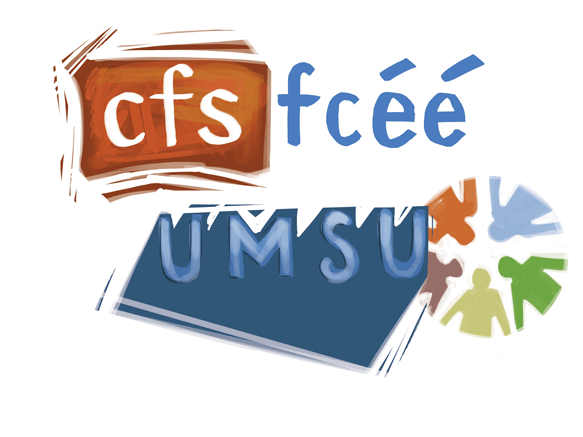The future of the Canadian Federation of Students’s (CFS) presence on the University of Manitoba campus may lie in the hands of the next University of Manitoba Student Union (UMSU) executive.
Over the last several years, the UMSU-CFS relationship has been plagued by the decision of a previous UMSU executive to withhold student fees owed to the provincial and national branches of CFS.
In the 2013-14 academic year, the UMSU representatives at the time refused to transfer fees to the student federation following a dispute contesting ownership of the umsu.ca domain name.
The Manitoban reported in December the dispute had been resolved, however the amount of outstanding fees was still being contested.
Earlier this month, UMSU agreed to pay $980,555.54 to put the dispute to rest. The sum includes provincial and national fees to the organization for the current year, and outstanding fees going back to 2013-14.
In December, outgoing UMSU president Jeremiah Kopp estimated the amount owed at $450,000, while the CFS pegged it at roughly $650,000, not including the current year’s fees.
Michael Barkman, chair for the Manitoba branch of CFS, wouldn’t elaborate on relations between UMSU and the federation, but advocated for a stronger partnership between the organizations.
“We need to be united as students across this province,” he said. “We need to speak with a collective voice, or else what happens is governments or the universities will divide us and that’s when things like tuition fee increases or massive fee increases for international students take place.”
Representatives from each of the four executive slates, as well as a solo candidate contesting the upcoming UMSU election, spoke with the Manitoban to outline their positions on the state of UMSU-CFS relations.
Largely, every slate expressed willingness to move forward with CFS in the future to establish a more positive relationship. Additionally, the slates unanimously disapproved of the lack of transparency surrounding the withholding of fees from CFS, agreeing there is a need for increased student involvement and awareness.
Strong UMSU
As both an executive member of UMSU and a CFS representative, Strong UMSU presidential nominee Astitwa Thapa took no official stance on whether the student union should maintain a partnership with CFS.
“It has to come from the students. I am respecting the mandate that students gave when they joined CFS,” he said, adding that he would also respect student wishes to defederate from the organization if it came to that.
Thapa was critical of what he called a lack of communication between the organizations and called for a renewed dialogue moving forward.
Zachary LeClerc (independent candidate)
Zachary LeClerc, current vice-president internal for UMSU, is seeking an independent presidency and spoke out against the past style of communication between UMSU and CFS.
He called for more open dialogue between the organizations. However, he also said CFS needs to re-evaluate its role on campus.
In November, LeClerc ran for national treasurer of CFS, losing out to University of Winnipeg Students’ Association president Peyton Veitch.
LeClerc acknowledged the merit of the student federation and the benefits it offers through its national reach but noted university institutions are highly diverse and that CFS needs to do more to recognize the individual autonomy and capacity of some of its members.
LeClerc condemned the use of executive actions by UMSU in the past, stressing greater emphasis should be placed on council involvement in decision making.
UMSU For You
Presidential candidate and current Arts Student Body Council president Tanjit Nagra spoke positively of CFS, saying UMSU ought to reconcile with the organization so students can enjoy unbridled access to the various services CFS has to offer.
“I’d like to solve whatever issue CFS has with UMSU and hopefully move on and prosper together,” she said.
Nagra condemned the fashion in which past UMSU executives have dealt with CFS, as did her running mate seeking the position of vice-president internal, Harrison Katz. Katz went on to blame personal politics for the poor relationship and said there is no place for that in the student union.
UMSU Forward
Presidential candidate and current CFS-MB treasurer Niall Harney spoke out against the way past UMSU executives handled dealings with the federation. Harney criticized the lack of transparency and condemned the fact that students ultimately paid for services but failed to receive them in their full scope due to UMSU’s decision to withhold fees.
“CFS has had to scale back the breadth of services they can provide, as well as the number of campaigns it can engage in,” he claimed. “It’s been working on a bare-bones sort of model for about three years now.”
Harney continued to say he would like to see more CFS activity on campus, advocating for allowing the organization to table for free on university grounds, a privilege most student groups enjoy that the federation currently does not.
Harvey also said he believes in reigniting provincial lobbying efforts. But he added he is not interested in pushing an agenda as an UMSU executive. Rather, he prioritizes being an active representative and respondent to students at the U of M.
Take Back
Presidential candidate and current UMSU students living with disabilities representative Andrew Fenwick strongly pushed for mending relations between UMSU and CFS.
Fenwick called for the two organizations to act more in sync, saying cooperation is more conducive to positive outcomes. He argued the recent disputes between UMSU and CFS have only resulted in dramatic losses for the student body, claiming the student union lost access to services offered by the federation.
Fenwick advocated for striking a more harmonious balance between UMSU and CFS, acknowledging the U of M as an individual university while stressing the importance of being a part of the larger student movement.


